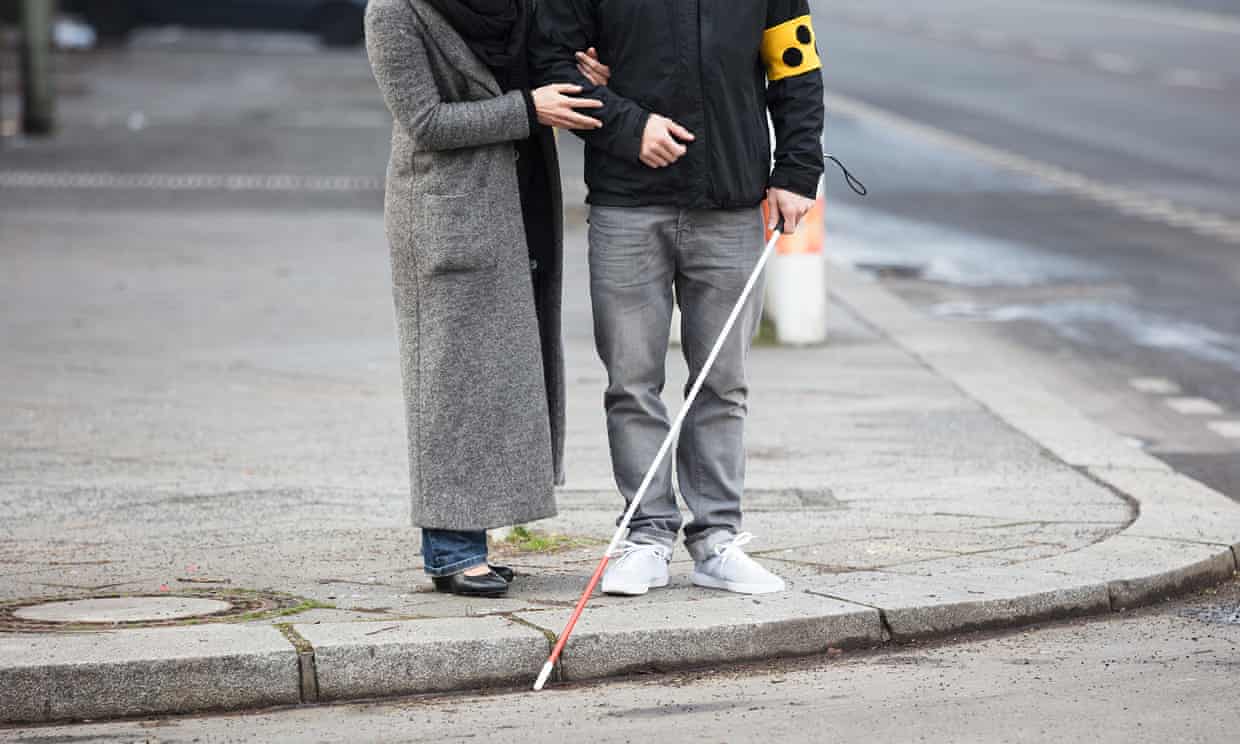
Opinion
Physical distancing makes life harder for blind people – just ask my friend Dave
He certainly doesn’t need the pity or prayers strangers offer him – but he does occasionally need a hand or elbow to help him cross a road
by Adrian ChilesI have a friend called Dave Kent who happens to be blind. You may have seen him on a Guide Dogs sponsor-a-puppy TV ad talking about how his dog Quince once saved his life. To my mind, this rather underplayed Quince’s importance. As far as I can tell, guide dogs such as Quince save their partners’ lives over and again every time they leave the house.
Dave is from Swansea and sounds like it, although he has lived in London for most of his six decades. We have had some brilliant times together. On one occasion, he asked if he could get the train from London to Swansea with me on a Friday night, as his dog was struggling with conjunctivitis. Also in our carriage, as it happened, was the actor Philip Glenister, at that time working on the TV series Ashes to Ashes. The train was slow, hours behind schedule, and our food and drink had run out by Bristol Parkway. Dave got up to go to the buffet.
“Don’t you need the dog?” asked Phil.
“No, man,” said Dave. “His eyes aren’t right.”
It was that kind of journey. Dave came back with all the buffet had left: several slices of fruitcake and a dozen miniature bottles of brandy. It was two in the morning when we alighted at Swansea to stagger along the platform. Me, Dave, the bloke from Life on Mars and a guide dog who couldn’t see properly. Wouldn’t have missed that journey for the world.
Soon after lockdown started, I got a couple of missed calls from Dave. Perhaps he was struggling? I geared myself up to play the hero and run over to help him out. But it turned out he was only calling to see if I was OK. Honestly, if I had asked him to do my shopping for me he would have been on his way out before I had finished the sentence.
The next call I got from him, alarmingly, was to ask if he could borrow a helmet. A friend who had come to stay to help him out had a motorbike and Dave wanted a ride. So, Dave has been just fine, but this week he is sounding a bit down. “I’ve realised this physical distancing is going to change everything for us,” he says. “Blind people live in a tactile world; we need to touch people and be touched by them. As independent as we might like to think we are, the fact is that we’re always relying on the thoughtfulness of strangers.”
I am ashamed to say this had never occurred to me. Dave and his current guide dog, Chad, are more than capable of looking after themselves. He doesn’t need pity; far from it. He is a bit sick of overenthusiastic evangelicals on public transport offering their prayers. A bloke on the Piccadilly line at Earl’s Court once asked if he could heal him. “Certainly,” said Dave, handing him one of his false eyes. “Give it a try, by all means.”
He doesn’t need healing. He doesn’t even need a hand; just an elbow to guide him. Like all blind people, whether they work with dogs or have canes, he needs to ask strangers to help him across busy roads.
“What are people supposed to say if I ask them now?” he wonders. “I don’t know if or how to ask them. And I feel a bit sorry for them, too; it puts them in an awkward position. I’m sure they’d want to help, but would it be a touch too much?”
Dave and Chad have travelled the world together, but Dave is now worried about lockdown lifting; for the first time he can remember, he is nervous about leaving his locale. He knows he can have my elbow, as well as my crash helmet, any time he wants.
- Adrian Chiles is a Guardian columnist